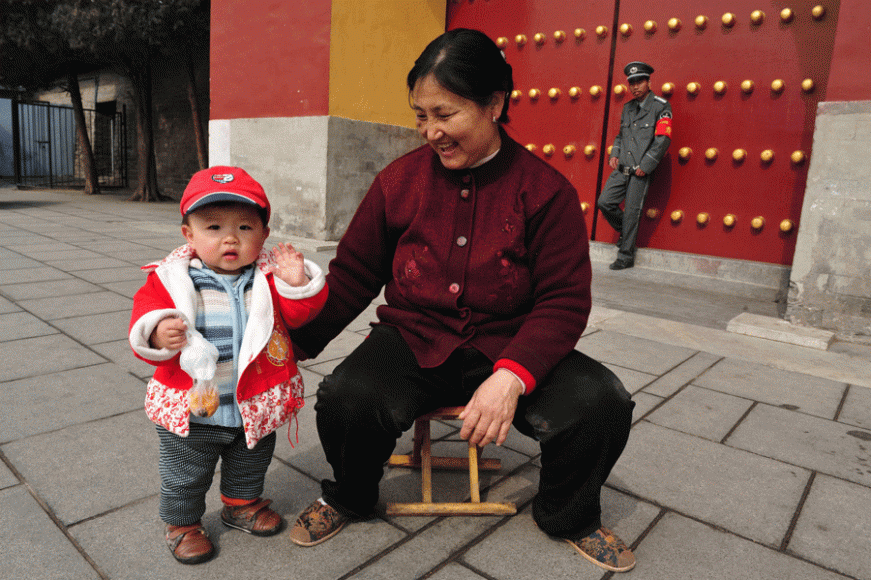Perhaps the most significant side effect of China’s one-child policy is the lack of siblings.
Modern China faces many challenges and contradictions to the traditional Chinese family structure that has been the most important component within Chinese society for centuries. In spite of the collapse of Imperial China in 1912, the Civil War between Mao Zedong’s Communists and Generalissimo Chiang Kai-shek’s Nationalist troops that ended with the Communist victory in 1950 and the chaos of the Cultural Revolution (1966-76), the traditional family was one of the few ideas that survived relatively unscathed.
Few Chinese have forgotten the importance of family, although elderly Chinese often lament the fact that their children and grandchildren, born in the 1980s or later, have no clear moral compass or respect for the rigid standards of family behavior established by Confucius, whose philosophy shaped the spring and autumn period of Chinese history (fifth and sixth centuries B.C.). He championed strong family loyalty, with respect and filial piety to one’s elders. Each family member had a specific place and form of address for older and younger brothers and sisters, with elder sons prized above daughters.
When my American missionary grandparents served with the China Inland Mission during the last years of the Imperial Qing Dynasty (1644-1912), Chinese families had an average of four children while most peasants had as many descendants as they could produce. Males were highly favored and female infanticide was culturally acceptable. In the 1890s, my grandmother rescued hundreds of abandoned baby girls and founded the first orphanage in Hubei Province.
At that time, several generations of the same family lived under one roof. Parents prearranged the life of their children and adult offspring felt obligated to return home on a regular basis for the rest of their lives.
By the 1940s, when my parents served as Canadian diplomats in Nationalist China and I was a student at the University of Nanjing, Chinese families still abided by the hierarchical Confucian code, but most of my fellow students complained about parental pressures and especially forced marriages.
When I returned to Communist China as a journalist in the 1970s, family life had changed radically. Traveling by train to Beijing, I was shocked to see flamboyant red banners emblazoned with “Have fewer children and raise more pigs” flying above the lines of young women from the communes harvesting the rice paddies. Similar signs were also painted on the rooftops and walls of village huts.
The one-child policy was enforced by law in 1979. It was initiated to curtail China’s rapid population growth but it had unexpected results, including fundamental human rights abuses. Most parents traditionally preferred males, who traditionally care for elderly parents. Sons became status symbols. Uncounted millions of female infants were aborted or abandoned. A generation later, Chinese society was seriously off balance by a skewed sex ratio. Orphanages were filled with girl babies, many of whom were adopted by Americans.
By 2018 most children were “male singletons” with no genetic siblings. Researchers reported an excess of males expected to reach 12 to 20 percent in 20 years. For the first time in history, China had more marriageable men than women. This has resulted in women power. Women are better educated and, to the surprise of men, they’ve become quite finicky when choosing husbands. They still have a long way to go, but women are claiming “half the sky.”
The first singletons born under the one-child policy experienced the absence of brothers and sisters and other far-reaching changes. Every family suddenly had more income to invest in education and consumer goods. Education costs soared over night. In the past many families had to choose only one of their children to progress to higher education. The income previously spread among several children in past generations was now focused on one child. “Only sons” were called little emperors. Many were considered spoiled and self-centered.
The very notion of “siblings” became alien. The term “brother” or “sister” was used when talking about cousins. The new singletons were better educated and had more opportunities but they shouldered pressure from two parents planning their lives and felt the responsibility of caring for aging parents.
Whether China’s singletons were hurt by the one-child policy or benefited from it is still a subject of debate. Researchers have been investigating what it is like to grow up in a world without brothers or sisters. Are siblings really that important?
Children born in the 1970s and ’80s were usually surrounded by large extended families, but those born more recently have parents who were singletons, too, so they grow up with fewer cousins and smaller families and experience a much different childhood than previous generations. Singletons cultivate new friends but have few long-term friends who grew up together.
University of Melbourne Economist Nisvan Erkal conducted a study of only children in Beijing, which found that because of the One-Child Policy singletons are “significantly less trusting, less trustworthy, more risk averse and less competitive … also more pessimistic and less conscientious.”
The one-child policy was recently relaxed but, contrary to government expectations, many parents see their singleton status in a positive light and refuse to have more children. My adopted Chinese son and his wife, for instance, who have one bright and beautiful but spoiled son, feel they cannot create as many opportunities for a second child and think he may feel lost in competitions. They were both singletons themselves and claim they did not want to share their parents with others.
What happens, though, when singletons are forced to share in the far, wide world?




